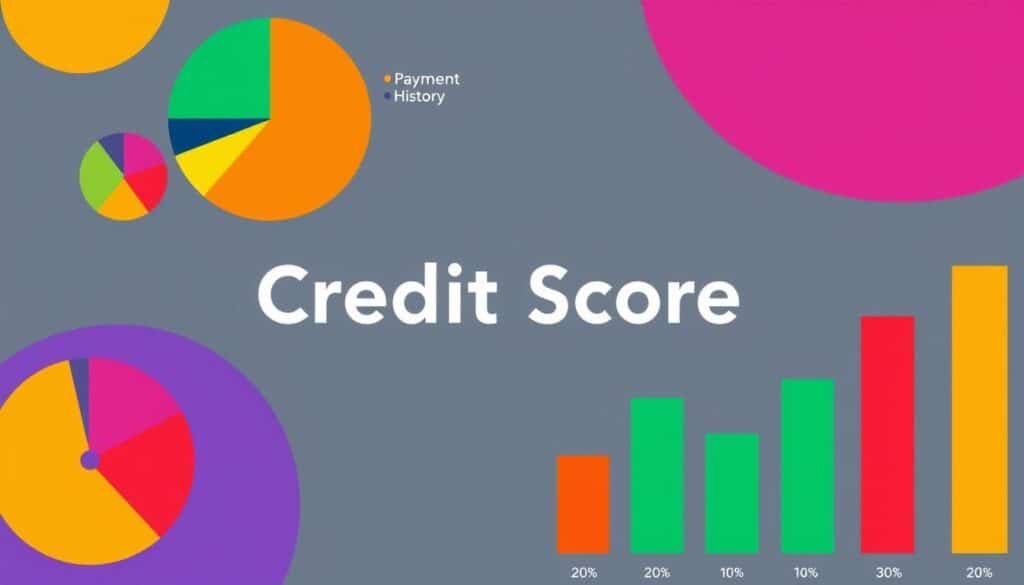Creditworthiness is how lenders see if you can pay back what you owe. They look at your credit reports, scores, income, how you’ve paid bills, and how you handle debt. If you’re seen as reliable, lenders might give you a loan.
Keeping your credit in good shape is key. It can help you get loans, find jobs, and even lower insurance costs. It’s also important for getting business funding.
Key Takeaways
- Creditworthiness is a lender’s assessment of an individual’s ability and willingness to repay debts.
- Lenders evaluate creditworthiness by reviewing credit reports, credit scores, income, payment history, and debt management.
- Creditworthy borrowers are considered responsible and reliable enough to make loan payments as agreed.
- Maintaining good creditworthiness is essential, as it can impact various aspects of an individual’s financial life.
- Understanding the factors that determine creditworthiness is crucial for building and maintaining a strong financial profile.
Understanding Creditworthiness
Creditworthiness shows how likely you are to pay back your debts. Lenders check this to decide if they’ll lend to you and what terms they’ll offer. Your credit report, score, payment history, debt, and income are key factors.
Key Factors in Determining Creditworthiness
Lenders look at your credit report and score to judge your risk. Your payment history, which is 35% of your FICO score, is most important. It shows if you manage your debt well.
Your credit utilization rate, or how much credit you use, is 30% of your score. Keeping your credit card balances low, like 25% or less, helps your creditworthiness.
Why Creditworthiness Matters
Good creditworthiness brings many benefits. It makes borrowing easier, helps with renting, insurance, and even jobs. A strong credit history means lower costs and better terms.
“A good credit history can open doors and lead to better financial opportunities.”
But, bad credit can block access to loans, good terms, or jobs. It’s vital to build and keep good creditworthiness for financial health and success.
Credit Reports and Credit Scores

Your credit report shows lenders your credit history. It includes your debts, payment history, and any negative marks. Credit scoring systems like FICO and VantageScore use this info to give you a credit score. This score shows how good you are with credit.
How Credit Reports Reflect Creditworthiness
The three big credit bureaus – Experian, TransUnion, and Equifax – keep your credit report. Lenders look at this report to decide if they should lend to you. A good report shows you can handle credit well, which helps your credit score.
The Role of Credit Scores in Creditworthiness
Credit scores are between 300 and 850. Higher scores mean you’re less risky. Lenders check your score and report to see if you’re a good candidate for loans or credit cards. Scores over 700 are good, and over 800 are excellent.
| Credit Score Range | Credit Risk Level |
|---|---|
| 800-850 | Excellent |
| 740-799 | Very Good |
| 670-739 | Good |
| 580-669 | Fair |
| 500-579 | Poor |
| 300-499 | Very Poor |
What affects your credit score includes how you pay back loans, the types of loans you have, and how long you’ve had credit. Knowing these factors can help you keep and boost your creditworthiness.
Payment History and Debt Management

Your payment history is key to your credit score, making up 35% of it. Lenders look for consistent, on-time payments. Missed or late payments, high credit card balances, and debt can hurt your score.
Keeping up with payments and managing debt well is crucial. In the U.S., a score of 700 or higher is good. Experts suggest keeping credit card use under 10%.
Public records like bankruptcies can also affect your score. They stay on your reports for years. It’s important to check your reports often and correct any errors or signs of identity theft.
“Timely payments make up approximately 35% of an individual’s credit score. Late or missed payments can result in penalties and negatively impact a credit score.”
Improving your payment history and managing debt can boost your creditworthiness. This can open up more financial opportunities and improve your overall financial health.
Creditworthiness and Income

Lenders look at more than just your credit history. They also check your income. They need proof of income, like pay stubs or tax returns, to see if you can pay back a loan. This helps them figure out if you can handle your debt.
Proof of Income Requirements
Lenders ask for certain documents to check your income. Here are some examples:
- Pay stubs or W-2 forms to show your job income
- Tax returns for a full view of your finances
- Bank statements to see if you have steady income
- Statements from other income sources, like rental properties
By looking at these documents, lenders get a clear picture of your finances. This helps them decide if you’re a good credit risk.
Debt-to-Income Ratio
Your debt-to-income (DTI) ratio is also important. It shows how much of your income goes to debt. Lenders use this to see if you can handle more debt.
| Debt-to-Income Ratio | Creditworthiness Impact |
|---|---|
| Less than 36% | Seen as low risk, showing you can handle more debt |
| 36% to 49% | May get credit, but lenders might worry about your debt |
| 50% or higher | Considered high risk, making it hard to get new credit |
Lenders like applicants with a low DTI. It means you can take on more debt and make payments on time.
Knowing how income, proof of income, and debt-to-income ratio affect your creditworthiness is key. It helps you improve your financial standing and get better credit terms.
Maintaining and Improving Creditworthiness
Having strong credit is key to getting good loans and reaching your money goals. By using smart creditworthiness strategies, you can boost your credit. You can also bounce back from credit problems.
Strategies for Building Creditworthiness
One top way to build creditworthiness is to always pay on time. This means paying bills like credit cards, loans, and utilities right when they’re due. Also, keep your credit card balances low, under 30% of what you can use, to improve your credit score.
Having different kinds of credit, like credit cards, loans, and mortgages, shows you can handle various credits well. This helps in building creditworthiness and making your credit look better.
Recovering from Setbacks
If your credit took a hit, like from late payments or bankruptcy, you can fix it. First, check your credit report for errors and fix them. Then, talk to creditors to lessen the harm of bad marks.
By showing you can manage money well, like paying on time and keeping balances low, you can recover your creditworthiness. Using secured credit cards or being an authorized user on someone else’s card can also help.
“Maintaining and improving creditworthiness is an ongoing process, but the rewards are well worth the effort. By implementing strategic actions, you can unlock a world of financial opportunities and achieve your goals.”
The Importance of Creditworthiness
Creditworthiness is key in your financial life. It lets you get loans, credit cards, and other financing easily. Good creditworthiness also helps when renting a home, getting insurance, and finding jobs. It opens doors to better financial chances and saves you money with lower rates and fees.
Your creditworthiness shows if you can pay back debts. It’s based on your credit score, from 300 to 850. Payment history, which is 35% of your score, is very important. Keeping your debt low and having a mix of credit types also helps.
Every time you apply for new credit, lenders check your report. So, it’s vital to watch your credit score and work on your creditworthiness. This means keeping old accounts open, using credit cards wisely, and fixing any credit report errors.
| Key Factors Influencing Creditworthiness | Importance |
|---|---|
| Payment History | 35% of credit score |
| Credit Utilization Ratio | Ideally 1-10% |
| Credit Mix | Installment and revolving credit |
| Credit History Length | Longer history improves score |
Understanding the importance of creditworthiness and working on your credit is crucial. It leads to better financial chances, saves money, and helps reach your goals. Good creditworthiness is essential for financial health and security.
Also Read: Repayment Schedule Strategies to Pay Off Your Loan Faster
Conclusion
Creditworthiness is more than just a number. It includes your credit history, scores, payment habits, debt, and income. Lenders look at this info to decide if they should lend to you and what terms to offer.
Knowing what affects your creditworthiness helps you improve it. This means checking your credit reports, managing your debt, and keeping your income stable. These steps can help you build a strong credit profile.
Having a good credit score and managing debt well opens up better financial chances. It can help you get loans, lower interest rates, and access more financial services. Your creditworthiness greatly influences these opportunities.
Stay informed about what affects your creditworthiness and work on improving it. This way, you can achieve financial success and unlock many possibilities. Remember, your credit score shows your financial responsibility and reliability.
FAQs
Q: What factors determine your creditworthiness?
A: Creditworthiness is determined by several factors, including your payment history, credit utilization, length of credit history, types of credit accounts, and recent credit inquiries. These elements collectively help lenders assess the risk of extending credit to you.
Q: Why is creditworthiness important?
A: Creditworthiness is important because it determines whether lenders will extend credit to a customer and at what interest rate. A higher creditworthiness can lead to better credit limits and lower interest rates on loans and credit cards.
Q: How can I improve my creditworthiness?
A: To improve your creditworthiness, it’s a good idea to pay your bills on time, reduce your credit card balances, avoid unnecessary credit inquiries, and maintain a diverse mix of credit accounts. Regularly checking your credit reports can also help you identify areas for improvement.
Q: What role do credit reporting agencies play in determining creditworthiness?
A: Credit reporting agencies like Experian and Equifax compile information about your credit accounts and payment history. Lenders use this information to evaluate your creditworthiness and decide whether to approve your credit application.
Q: How do lenders assess a customer’s creditworthiness?
A: Lenders assess a customer’s creditworthiness by reviewing credit reports, analyzing credit scores, and considering the customer’s monthly income and existing debt obligations. This comprehensive evaluation helps them decide the level of risk involved in extending credit.
Q: What is a credit limit and how is it related to creditworthiness?
A: A credit limit is the maximum amount of credit that a lender extends to you on a credit card or line of credit. Your creditworthiness is important because it influences the credit limit offered; a higher creditworthiness typically results in a higher credit limit.
Q: How many credit inquiries can affect my creditworthiness?
A: Multiple credit inquiries can potentially lower your credit score and affect your creditworthiness. It’s important to limit the number of credit applications you submit in a short period to minimize negative impacts on your credit rating.
Q: What should I do if I have a low credit rating?
A: If you have a low credit rating, it’s important to understand the factors that contribute to your creditworthiness. Consider taking steps to build credit, such as making timely payments, keeping credit card balances low, and applying for credit responsibly.
Q: Can my creditworthiness affect my ability to get a car loan?
A: Yes, your creditworthiness determines whether lenders will approve your car loan application and the interest rate they will offer. A higher creditworthiness can help secure a better loan offer, while a lower creditworthiness may result in higher rates or denial of credit.


